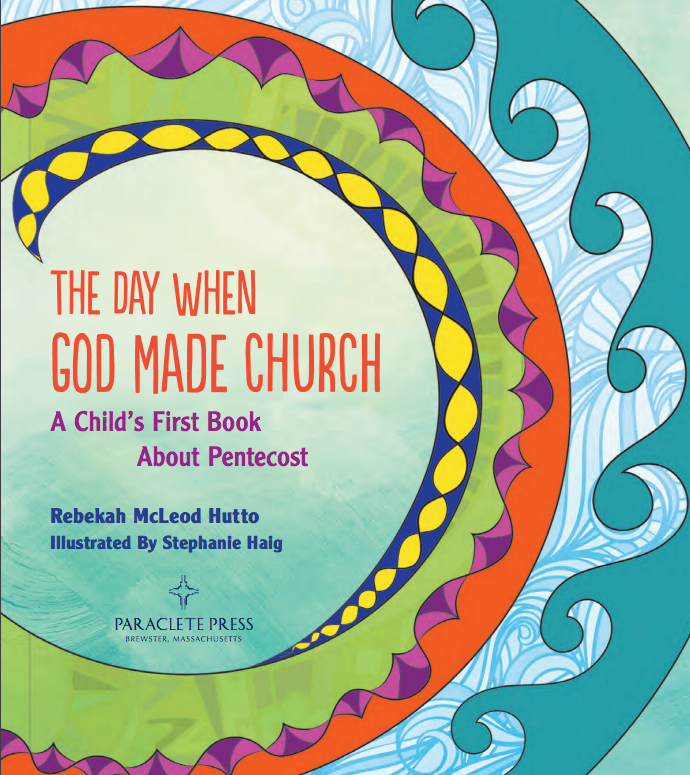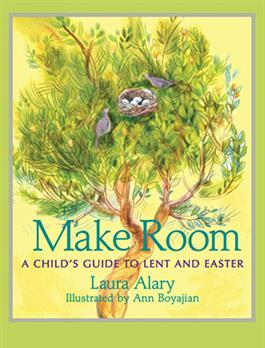FREE shipping on orders of $200+
Quantity discounts and shipping details here.
“Who will stay with us?”
Today’s guest blogger is Laura Alary, author of Make Room: A Child’s Guide to Lent and Easter
I am getting ready to go out. It is only for the day, but I require a lot of gear. By the front door, my youngest daughter prances around a pile of bags, investigating and wondering aloud. A frown creases her forehead as the questions pour out:
“Where are you going? How long will you be gone? Who will stay with us?”
There is something oddly familiar about her words. Then I remember. My mind flits to that moment in the gospel of John when Jesus, reclining in the lamplight around a table with his closest friends, breaks the news to them that he will soon be leaving. Their questions are those of children afraid to be left alone:
“Where are you going? When are you coming back? Who will stay with us?”
Among other things, Pentecost is a response to these anxious questions. But we rarely celebrate it that way. Observing Pentecost—especially with children—often owes more to the book of Acts than to the gospel of John. Acts describes the joyful chaos, the crowds of people, the palimpsest of voices and languages, the wind and fire. The scene is loud and noisy and oriented outward. The disciples burst from behind locked doors and rush into the streets; the message travels outward from Jerusalem and spreads out across the face of the earth.
Acts is Pentecost for extroverts.
Our celebrations frequently mirror these extroverted qualities. We throw a party, complete with balloons, streamers, pinwheels, bubbles, bright colours, birthday cake and candles. And why not? Parties are fun. So are gifts. Children can certainly relate to them, and to the thrill of waiting for something new and exciting. And what better excuse for a party than the birth of a new kind of family with its all its varied and abundant gifts?
But sometimes important things get lost amid the cake and wrapping paper.
The Gospel of John gives us a very different account of the gift of the Spirit. This other version—I like to think of it as the introverted version—happens in a locked room, in an atmosphere thick with worry. The disciples have retreated there because they are terrified and have no idea what to do or where to go. Their worst fears have come to pass. They are all alone and there is no one to help.
Into this fearful place, Jesus comes. His words are few. Be at peace, he tells his friends. Receive the Holy Spirit. Then he breathes on them, and something mysterious begins to stir in them, the way it did when God breathed life into the muddy nostrils of those first earth creatures in the ancient story of the beginning. The disciples can feel they are not alone. And somehow that makes all the difference.
In her lovely book about Pentecost, The Day When God Made Church, Rebekah McLeod Hutto describes the gift of words in all their wonderful variety: “Some with LOUD sounds, some with quiet whispers, words like drumbeats, words that tiptoe through the air.” How true. It is not only the loud and bold words that matter. The gentle and quiet ones do too.
Peace.
I love you.
I am with you.
You are not alone.
Such words are a precious gift to children who, like the disciples, know the fear of being left alone, the sensation of feeling small and powerless, the anxiety of not knowing what lies ahead. Their connection to the story of Pentecost runs deep.
How can we help children explore this connection? Perhaps by making some space for silence in the middle of all the noise and hilarity. Perhaps by wondering together about different kinds of words and what they do. Which words build up? Which ones tear down? Are there times when it is better to be quiet? To speak out? How can we use our words to bring peace? To encourage? To spread kindness?
Maybe Pentecost is the time to get out the crayons and beads and fabric and play together with some new forms of prayer, especially those practices which nurture awareness of the divine presence in and around us. Praying in colour, centering prayer, praying with beads, making prayer flags—there are so many ways to practise paying attention so we can look on the world with wonder and see the movement of the Spirit.
These things might not make for a rollicking party. But they do bring peace to anxious hearts, encourage those with gentler voices, stir kindness and confidence, and open young and old to a clearer way of seeing.
And there is always room for cake and balloons.


